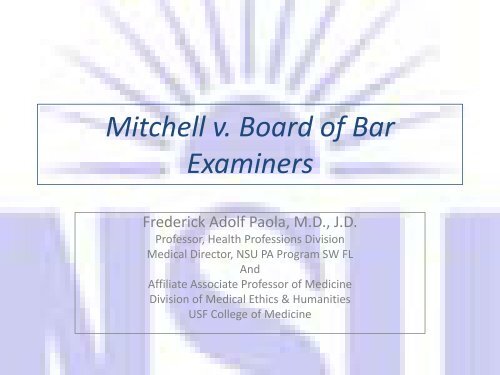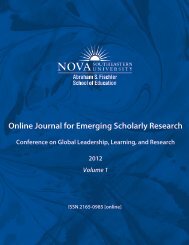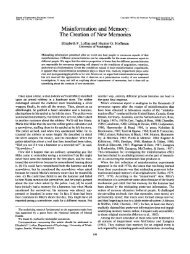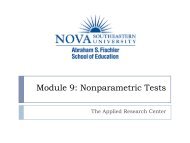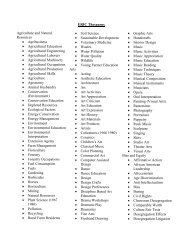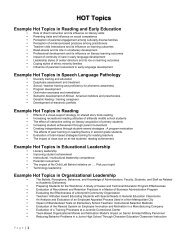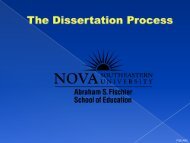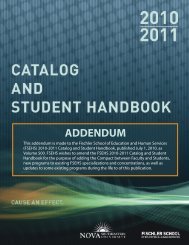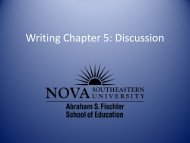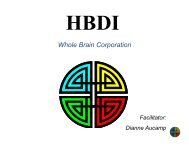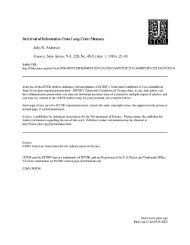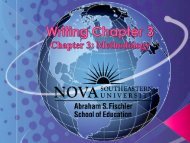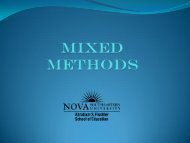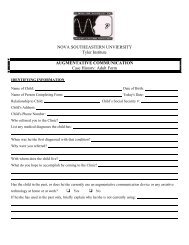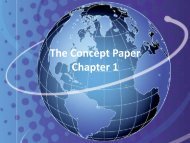Mitchell v. Board of Bar Examiners: An Update Regarding Online ... - 1
Mitchell v. Board of Bar Examiners: An Update Regarding Online ... - 1
Mitchell v. Board of Bar Examiners: An Update Regarding Online ... - 1
You also want an ePaper? Increase the reach of your titles
YUMPU automatically turns print PDFs into web optimized ePapers that Google loves.
<strong>Mitchell</strong> v. <strong>Board</strong> <strong>of</strong> <strong>Bar</strong><br />
<strong>Examiners</strong><br />
Frederick Adolf Paola, M.D., J.D.<br />
Pr<strong>of</strong>essor, Health Pr<strong>of</strong>essions Division<br />
Medical Director, NSU PA Program SW FL<br />
<strong>An</strong>d<br />
Affiliate Associate Pr<strong>of</strong>essor <strong>of</strong> Medicine<br />
Division <strong>of</strong> Medical Ethics & Humanities<br />
USF College <strong>of</strong> Medicine
Facts<br />
• <strong>Mitchell</strong> was a 2004 graduate <strong>of</strong> Concord Law<br />
School (Concord)<br />
– Wholly online law school<br />
– Not ABA approved, but authorized by the State <strong>of</strong><br />
California to grant J.D.<br />
• <strong>Mitchell</strong> takes and passes the California bar<br />
examination in 2004<br />
• He is a Massachusetts resident since 1981 and<br />
desires admission to the Massachusetts (MA) bar
Facts<br />
Authorized by Bureau for Private Postsecondary & Vocational Education, pursuant to<br />
California Code, to grant the degree <strong>of</strong> juris doctor. Concord is also accredited by the<br />
Distance Education and Training Council (DETC), a member <strong>of</strong> the Council for Higher<br />
Education Accreditation (CHEA) and the International Association <strong>of</strong> Law Schools (IALS).
Facts<br />
• Paths to admission to MA bar<br />
– Admission to MA bar by passing the MA bar<br />
examination<br />
• SJC Rule 3:01, section 3.3 states: “Each applicant shall<br />
have graduated with a degree <strong>of</strong> . . . juris doctor from a<br />
law school which, at the time <strong>of</strong> graduation, is<br />
approved by the [ABA] or is authorized by statute <strong>of</strong> the<br />
Commonwealth to grant the degree <strong>of</strong> . . . juris doctor.”<br />
– Admission to the bar “on motion”<br />
• Attorneys who have attended non‐ABA‐approved law<br />
schools may be admitted after 5 years practice; but . . .
Rule 3:01, section 3<br />
• Section 3. Qualifications for Taking <strong>Bar</strong> Examination.<br />
– 3.3 Law School. Each applicant shall have graduated with a<br />
degree <strong>of</strong> . . . juris doctor from a law school which, at the time<br />
<strong>of</strong> graduation, is approved by the [ABA] or is authorized by<br />
statute <strong>of</strong> the Commonwealth to grant the degree <strong>of</strong> . . . juris<br />
doctor.<br />
– 3.4 Foreign Law Schools. <strong>An</strong>y applicant who received his legal<br />
education at a law school located outside <strong>of</strong> . . . the United<br />
States shall have . . . legal education equivalent, in the <strong>Board</strong>'s<br />
opinion, to that provided in law schools approved by the [ABA].<br />
Before permitting such an applicant to take the law<br />
examination, the <strong>Board</strong> in its discretion may, as a condition to<br />
such permission, require such applicant to take such further<br />
legal studies as the <strong>Board</strong> may designate at a law school<br />
approved by the [ABA].
Rule 3:01, section 6<br />
• Section 6. Admissions on Motion.<br />
– 6.1 Attorneys Admitted in Other States. A person who has been<br />
admitted as an attorney <strong>of</strong> the highest judicial court <strong>of</strong> any State . . . <strong>of</strong><br />
the United States may apply to the Supreme Judicial Court (SJC) for<br />
admission on motion as an attorney in this Commonwealth. The <strong>Board</strong><br />
<strong>of</strong> <strong>Bar</strong> <strong>Examiners</strong> may, in its discretion, excuse the applicant from<br />
taking the regular law examination on the applicant's compliance with<br />
the following conditions:<br />
• 6.1.1 The applicant shall have been admitted in the other state . . . for at least<br />
five years prior to applying for admission in the Commonwealth . . . .<br />
• 6.1.2 The applicant shall have so engaged in the practice or teaching <strong>of</strong> law<br />
since the prior admission as to satisfy the <strong>Board</strong> <strong>of</strong> <strong>Bar</strong> <strong>Examiners</strong> <strong>of</strong> his or her<br />
good moral character and pr<strong>of</strong>essional qualifications.<br />
• 6.1.4 The applicant shall have . . . graduated from a law school which at the<br />
time <strong>of</strong> graduation was approved by the [ABA] or was authorized by a state<br />
statute to grant the degree <strong>of</strong> . . . juris doctor.
Rule 3:01, section 6<br />
• Section 6. Admissions on Motion.<br />
– 6.2 Attorneys Admitted in Foreign Countries. A person who has been<br />
admitted or enrolled as an attorney <strong>of</strong> the highest judicial court <strong>of</strong> a<br />
foreign country may apply to the [SJC] to be admitted, without<br />
examination, as an attorney in this Commonwealth. The <strong>Board</strong> <strong>of</strong> <strong>Bar</strong><br />
<strong>Examiners</strong> may, in its discretion, excuse the applicant from taking the<br />
regular law examination on compliance with the following conditions:<br />
• 6.2.1 The applicant's principal residence is in the Commonwealth <strong>of</strong><br />
Massachusetts.<br />
• 6.2.2 The applicant shall have been admitted in the foreign country for at least<br />
five years prior to applying for admission in the Commonwealth . . . .<br />
• 6.2.3 The applicant shall have . . . completed such legal education as, in the<br />
opinion <strong>of</strong> the <strong>Board</strong> <strong>of</strong> <strong>Bar</strong> <strong>Examiners</strong>, is equivalent to that provided in law<br />
schools approved by the [ABA].<br />
• 6.2.4 The applicant shall have so engaged in the practice or teaching <strong>of</strong> law<br />
since the prior admission as to satisfy the <strong>Board</strong> <strong>of</strong> <strong>Bar</strong> <strong>Examiners</strong> <strong>of</strong> his or her<br />
good moral characterand pr<strong>of</strong>essional qualifications.
Facts<br />
• <strong>Mitchell</strong>’s problems re: admission by exam<br />
– Concord not authorized by MA statute to grant JD<br />
– Concord not ABA‐approved under “Standards for<br />
Approval <strong>of</strong> Law Schools”<br />
• Standard 306: a law school may only allow 4<br />
credits/term to be taught at a distance, and only 12<br />
credits for an entire program<br />
• Standard 701: a law school must have fixed facilities<br />
• Standard 702: a law school must have a physical library
Facts<br />
• Oct 2005: <strong>Mitchell</strong> seeks meeting with board discuss<br />
his desire to become a member <strong>of</strong> the MA bar; board<br />
informs <strong>Mitchell</strong> “it has no power to waive . . . the<br />
Court’s rules”<br />
• March 2006: <strong>Mitchell</strong> asks Court’s Rules Committee for<br />
permission to sit for bar; majority <strong>of</strong> Committee votes<br />
to deny request<br />
• May 2006: <strong>Mitchell</strong> asks Rules Committee to either<br />
reconsider or amend the rules to allow him to sit for<br />
the bar exam; majority <strong>of</strong> Committee votes not to<br />
reconsider, and solicits comments from <strong>Board</strong> <strong>of</strong> <strong>Bar</strong><br />
<strong>Examiners</strong> re: his proposal to amend the rules
Facts<br />
• June 2006: board recommends against<br />
amendment <strong>of</strong> rules<br />
• December 2006: Rules Committee refers<br />
<strong>Mitchell</strong>’s request to Justices <strong>of</strong> the SJC, who<br />
convene a Working Group to consider<br />
amendments to the rules regarding qualifications<br />
to take the bar examination<br />
– Working Group recommends that amendments to<br />
rules not be adopted<br />
– Court accepts recommendation but asks ABA to give<br />
attention to the issue <strong>of</strong> distance learning in legal<br />
education
Link to view oral argument<br />
• http://www.suffolk.edu/sjc/archive/2008/SJC_<br />
10157.html
<strong>Mitchell</strong>’s arguments<br />
• <strong>Mitchell</strong> challenges constitutionality <strong>of</strong> the<br />
rule as applied to him; alternatively . . .<br />
• <strong>Mitchell</strong> seeks an amendment to the rule; or<br />
• <strong>Mitchell</strong> seeks a waiver <strong>of</strong> the rule in his case
<strong>Mitchell</strong>’s constitutional argument<br />
• <strong>Mitchell</strong> argues that requiring graduation from an<br />
ABA‐approved law school as a condition to sitting<br />
for the MA bar violates equal protection<br />
guarantees <strong>of</strong> the MA Declaration <strong>of</strong> Rights<br />
– Different law school educational requirements for<br />
attorneys seeking admission to MA bar by taking the<br />
bar exam and those seeking admission to the MA bar<br />
on motion<br />
– Different law school educational requirements for<br />
attorneys trained in non‐ABA approved U.S. law<br />
schools and foreign law schools
<strong>Mitchell</strong>’s rule change argument<br />
• Proposed change to Rule 3:01, section 3.3<br />
– 3.3 Law School. Each applicant shall have graduated with a<br />
degree <strong>of</strong> bachelor <strong>of</strong> laws or juris doctor from a law<br />
school which, at the time <strong>of</strong> graduation, is approved by the<br />
American <strong>Bar</strong> Association or is authorized by statute <strong>of</strong> the<br />
Commonwealth to grant the degree <strong>of</strong> bachelor <strong>of</strong> laws or<br />
juris doctor, except that an applicant who has been<br />
admitted as an attorney <strong>of</strong> the highest judicial court <strong>of</strong> any<br />
state, district or territory <strong>of</strong> the United States alternatively<br />
may have graduated from with a degree <strong>of</strong> . . . juris doctor<br />
from a law school which, at the time <strong>of</strong> graduation, was<br />
authorized by a state statute to grant the degree <strong>of</strong> . . .<br />
juris doctor.
Court’s decision<br />
• Court does not reach the constitutional<br />
argument, deciding the case on other grounds
Court’s analysis<br />
• The court decides to waive the law school accreditation<br />
requirement set out in SJC Rule 3:01, section 3.3<br />
• The court points out that it has equitable power to<br />
waive requirements <strong>of</strong> a court rule concerning<br />
admission to the bar<br />
– Equity: “Justice administered according to fairness as<br />
contrasted with the strictly formulated rules <strong>of</strong> common<br />
law.” (Black’s Law Dictionary, Abridged 6 th ed., p 374)<br />
• Historically: courts <strong>of</strong> equity (courts <strong>of</strong> chancery)<br />
• Merger <strong>of</strong> actions at law and actions in equity<br />
– Equitable remedies: injunction, specific performance
Court’s analysis<br />
• 2 considerations<br />
– <strong>Mitchell</strong> and his educational accomplishments in the field<br />
<strong>of</strong> law<br />
• <strong>Mitchell</strong>’s “core course <strong>of</strong> study . . . substantively very similar to<br />
the core content <strong>of</strong>fered at ABA‐approved law schools.”<br />
• Received awards for<br />
– “Outstanding achievement” in three first year courses<br />
– “Best oral advocate” and “best brief” in third year moot court exercise<br />
– Graduated with “highest honors” as class valedictorian July 2004<br />
• <strong>Mitchell</strong> has passed California bar exam, and did so on first<br />
attempt<br />
• <strong>Mitchell</strong> admitted to practice both in California and before the U.S.<br />
Court <strong>of</strong> Appeals for the First Circuit<br />
• <strong>Mitchell</strong> represented himself (pro se) commendably
First Circuit
Court’s analysis<br />
• <strong>Mitchell</strong>’s personal record “not a sufficient<br />
reason in itself to waive the ABA approval<br />
requirement <strong>of</strong> S.J.C. Rule 3:01, section 3.3; if<br />
it were, the exception might well swallow the<br />
rule.”
Court’s analysis<br />
• Second consideration—recent announcement by<br />
ABA “that it is undertaking a comprehensive<br />
review <strong>of</strong> its approval standards,” including<br />
“consideration <strong>of</strong> schools and programs using<br />
online distance learning”<br />
– “[I]n view <strong>of</strong> the fact that an online legal education<br />
program such as Concord’s cannot qualify for ABA<br />
approval under the current ABA standards and that<br />
the situation . . . may change in the reasonably near<br />
future, equitable considerations weigh in favor <strong>of</strong><br />
granting <strong>Mitchell</strong> a waiver . . . .”
Court’s conclusion<br />
• “Our determination that a waiver . . . Is<br />
appropriate for <strong>Mitchell</strong> is based wholly on<br />
the particular circumstances presented in his<br />
individual case . . . . We refer <strong>Mitchell</strong>’s<br />
application to the board with instructions that<br />
he be allowed to sit for the bar examination.”
Judge Ireland’s dissent<br />
• Appointed Associate Justice<br />
<strong>of</strong> the Supreme Judicial<br />
Court in 1997<br />
• The first African‐American<br />
to sit on this bench in its<br />
over three hundred year<br />
history<br />
• Received his B.A. from<br />
Lincoln University, J.D. from<br />
Columbia University Law<br />
School, LL.M. from Harvard<br />
Law School, and Ph.D. in<br />
Law, Policy and Society from<br />
Northeastern University
Judge Ireland’s dissent<br />
• Disagrees with the majority’s conclusion that,<br />
“given the ABA’s pending comprehensive<br />
review <strong>of</strong> schools and programs using online<br />
distance learning, equitable considerations<br />
weigh in favor <strong>of</strong> granting the plaintiff a<br />
waiver to sit for the Massachusetts bar<br />
examination.” (Underlining added)
Judge Ireland’s dissent<br />
• Reasons for disagreeing<br />
– ABA approval serves an important function<br />
(providing an objective method <strong>of</strong> determining<br />
quality <strong>of</strong> legal education), and judiciary is illequipped<br />
to conduct its own evaluation re: the<br />
quality <strong>of</strong> legal education
Judge Ireland’s dissent<br />
• Reasons for disagreeing<br />
– Novak is distinguishable
Judge Ireland’s dissent<br />
• “Finally, I conclude that the court’s claim that<br />
it can limit its holding to the circumstances in<br />
this case is illusory. . . . I am concerned with<br />
the potential for having to assess large<br />
numbers <strong>of</strong> graduates from other online law<br />
schools.”
Distance‐learning law schools in<br />
California*<br />
• Abraham Lincoln University School <strong>of</strong> Law<br />
• American Heritage University School <strong>of</strong> Law<br />
• Aristotle University Institute <strong>of</strong> Law and<br />
Jurisprudence<br />
• California School <strong>of</strong> Law<br />
• Concord School <strong>of</strong> Law<br />
*Registered by Committee <strong>of</strong> <strong>Bar</strong> <strong>Examiners</strong> <strong>of</strong> the State <strong>Bar</strong> <strong>of</strong> California as<br />
unaccredited distance‐learning law schools, conducting instruction and providing<br />
interactive classes principally by technological means. See<br />
http://www.calbar.ca.gov/state/calbar/calbar_generic.jsp?cid=10115&id=5128#cals.
Correspondence law schools in<br />
California*<br />
• California Southern University (1978)<br />
• MD Kirk School <strong>of</strong> Law (2005)<br />
• Northwestern California University School <strong>of</strong> Law<br />
(1982)<br />
• Oak Brook College <strong>of</strong> Law and Government Policy<br />
(1999?)<br />
• University <strong>of</strong> Honolulu (1992)<br />
• William Howard Taft University (1976)<br />
*Registered by the Committee <strong>of</strong> <strong>Bar</strong> <strong>Examiners</strong> <strong>of</strong> the State <strong>Bar</strong> <strong>of</strong> California as<br />
unaccredited correspondence law schools, conducting instruction principally by<br />
correspondence.<br />
See<br />
http://www.calbar.ca.gov/state/calbar/calbar_generic.jsp?cid=10115&id=5128#cals.
Unaccredited fixed‐facility law schools<br />
in California*<br />
• American College <strong>of</strong> Law<br />
• Aristotle University College <strong>of</strong><br />
Law—Carlsbad<br />
• Aristotle University College <strong>of</strong><br />
Law—Temecula<br />
• California Southern Law School<br />
• East Bay Law School<br />
• Inland Valley University<br />
• Irvine University College <strong>of</strong> Law<br />
• John William University School<br />
<strong>of</strong> Law<br />
• Larry H. Layton School <strong>of</strong> Law<br />
• McMillan Academy School <strong>of</strong> Law<br />
• Pacific Coast University School <strong>of</strong><br />
Law<br />
• Pacific West College <strong>of</strong> Law<br />
• People’s College <strong>of</strong> Law<br />
• Silicon Valley University Law<br />
School<br />
• University <strong>of</strong> Northern California<br />
• University <strong>of</strong> San Luis Obispo<br />
School <strong>of</strong> Law<br />
• Western Sierra Law School<br />
*Registered by the Committee <strong>of</strong> <strong>Bar</strong> <strong>Examiners</strong> <strong>of</strong> the State <strong>Bar</strong> <strong>of</strong> California as<br />
unaccredited fixed‐facility law schools, conducting instruction principally in physical<br />
classroom facilities. See<br />
http://www.calbar.ca.gov/state/calbar/calbar_generic.jsp?cid=10115&id=5128#cals.
Consequences<br />
• Increased likelihood that the Rules Committee<br />
will change the rule in Massachusetts<br />
• Outcome may prod other states to allow<br />
graduates <strong>of</strong> online law schools to sit for their bar<br />
exams<br />
• Outcome may increase the likelihood that the<br />
ABA will more favorably deal with distancelearning<br />
law schools in the future<br />
• Outcome may portend a blurring <strong>of</strong> the line<br />
between distance‐learning and fixed‐facility law<br />
schools


